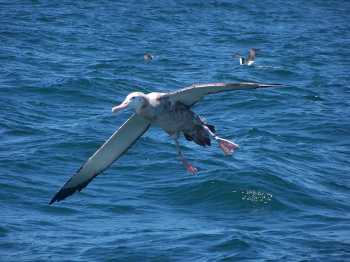Fernanda Colabuono (Universidade de São Paulo, Instituto Oceanográfico, Laboratório de Química Orgânica Marinha, São Paulo, Brazil) and colleagues have published in the Marine Pollution Bulletin on carbon and nitrogen stable isotopes and organochlorine contaminants in five species of South Atlantic albatrosses and petrels.
The paper’s abstract follows:
“Carbon and nitrogen stable isotopes in albatrosses and petrels collected off southern Brazil were compared with concentrations of organochlorine contaminants (OCs). δ13C and δ15N values, as well as OCs concentrations, exhibited a high degree of variability among individuals and overlap among species. δ13C values reflected latitudinal differences among species, with lower values found in Wandering and Tristan Albatrosses and higher values found in Black-browed and Atlantic Yellow-nosed Albatrosses and White-chinned Petrels. Some relationships were found between OCs and stable isotopes, but in general a partial ‘uncoupling’ was observed between OCs concentrations and stable isotopes ratios (especially forδ15N). δ13C andδ15N values in Procellariiformes tissues during the non-breeding season appear to be a better indicator of foraging habitats than of trophic relationships, which may partially explain the high degree of variability between concentrations of OCs and stable isotopes ratios in birds with a diversified diet and wide foraging range.”

Tristan Albatross off South America, photograph by Martin Abreu
Reference:
Colabuono, F.I, Barquete, V., Taniguchi, S., Ryan, P.G. & Montone, R.C. 2014. Stable isotopes of carbon and nitrogen in the study of organochlorine contaminants in albatrosses and petrels. Marine Pollution Bulletin 83: 241-247.
John Cooper, ACAP Information Officer, 13 July 2014

 English
English  Français
Français  Español
Español